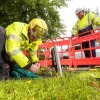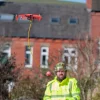UPDATE BT and Gov Propose £600m 10Mbps Broadband USO Universal Service
After a lot of negotiation the Government and BT have today proposed a deal that could see the operator fund a new Universal Service Obligation (USO), which will aim to ensure that everybody can request a broadband download speed of at least 10Mbps by 2020. Now for the caveats.
At present fixed line “superfast broadband” (24Mbps+) connections are already estimated to cover around 93% of homes and businesses in the United Kingdom and the Government’s Broadband Delivery UK programme predicts that this could reach 97% by 2020, which leaves around 3% of premises in predominantly rural areas (plus some disadvantaged urban spots) to suffer from slow connectivity; this is where the USO will focus.
Catering for the final 3% by delivering universal fixed line coverage of “superfast broadband” would be hugely expensive (the BSG estimated up to £1.4bn) and so the cash-strapped Government initially proposed a slower Universal Service Obligation (USO) to fill the gap, which pledged to provide an “affordable” connection that can deliver Internet speeds of at least 10Mbps (estimated to cost anything from £180m and up to £1bn).
Advertisement
The proposal was a significant step up from the current USO, which is delivered exclusively via fixed lines and only requires KCOM (Hull only) or BT (Openreach) to deliver, following the “reasonable request of any End-user” (i.e. demand-led), a telephone service that includes the ability to offer “data rates that are sufficient to permit functional internet access” (here); this was such a low bar that even slow dial-up lines could hit it.
The new rule forms part of the Government’s Digital Economy Act 2017 and we’ve included an extract from that below.
DEAct 2017 Extract
(2A) The provision made under subsection (1) is referred to as “the universal service order”.
(2B) The universal service order may in particular say that broadband connections and services must be provided to any extent, but may not do so unless—
—— (a) it specifies the minimum download speed that must be provided by those connections and services, and
—— (b) the speed so specified is at least 10 megabits per second.
(2C) The universal service order may contain—
—— (a) guidance about matters relating to the speed or other characteristics of broadband connections or services that it says must be provided (as well as or, except in the case of the minimum download speed, instead of setting out any of those characteristics); and
—— (b) guidance about any other matters relating to those connections or services.
Oddly the Government has chosen Sunday to launch a major consultation on the USO design, which is perhaps a reaction to yesterday’s cross-party Broadbad 2.0 report from Grant Shapps MP (here). As part of today’s announcement the Government has also confirmed that BT have offered to voluntarily fund the 10Mbps USO and the operator claims this would involve an estimated investment of £450m – £600m (depending on the final technology solution).
The new USO would be considered a minimum performance level that BT, upon request from an end-user, must deliver (i.e. most properties will get much faster speeds than 10Mbps). BT proposes that they would fund this investment and recover its costs through the charges for products providing access to its local access networks, albeit only if Ofcom factors this in when setting future regulation (i.e. Ofcom’s plan to cut the cost of Openreach’s 40Mbps [10Mbps upload] FTTC product (here) may need to be softened).
Advertisement
Gavin Patterson, BT’s CEO, said:
“We are pleased to make a voluntary offer to deliver the Government’s goal for universal broadband access at minimum speeds of 10Mbps.
This would involve an estimated investment of £450m – £600m depending on the final technology solution.
This investment will reinforce the UK’s status as the leading digital economy in the G20. We already expect 95% of homes and businesses to have access to superfast broadband speeds of 24Mbps or faster by the end of 2017. Our latest initiative aims to ensure that all UK premises can get faster broadband, even in the hardest to reach parts of the UK.”
BT is expected to reach most of those in the final 3% by using their modified Fibre-to-the-Cabinet (FTTC / VDSL2) technology, which is called Long Reach VDSL (details here, here and here); this would be sold like normal FTTC packages via ISPs. Other technology solutions like FTTP, FTTrN, WTTC and G.fast may also have a role to play.
Openreach has previously indicated that LR-VDSL could enable their “fibre broadband” network to cover 99%+ of homes in the United Kingdom by the end of 2020 (i.e. the 99% figure is likely to support speeds of 24Mbps+), but that would still leave a question mark over the final 1% and this is where the deal includes a few caveats.
The USO Caveats
* BT expects to complete the build of this fixed network by either December 2021 or December 2022 depending on the mix of technologies used, some of which are subject to trial and industry consultation. This is obviously later than the 2020 date and so a few changes are required (see below).
* BT plans to launch the fixed wireless broadband service so that the UK will have 10Mbps coverage to around 99% by the end of 2020. Fixed wireless will be made available at an affordable price for hard to reach premises. At this stage it’s unclear whether BT will harness EE’s 4G network for this (makes the most sense) or adopt a different approach, such as White Space wireless (they trialled it some years ago).
* The expectation is that around 0.3% of UK premises will still be un-served by a 10Mbps fixed line USO come 2022 and so inferior Satellite technology will be used to cater for these, which is unlikely to go down well with those affected.
* All of these technologies will come with quality standards and requirements to minimise delays from contention and latency, although sadly upload speeds would only be required to deliver a minimum performance of 1Mbps and that is already starting to look very slow by modern standards.
* The Government also appears to be considering data cap of at least 100GB per month for their USO (Ofcom’s data from 2016 suggested that the average broadband connection already uses 153GB and this will no doubt be a lot higher by 2020).
The other catch is that Openreach’s LR-VDSL technology works best when older ADSL broadband services are disabled, which complicates the roll-out because ISPs then need to be convinced to play ball and vested interests can make that tricky. Encouraging consumers to swap from ADSL to LR-VDSL lines could also be made more difficult if Ofcom is required to soften their proposal for a cheaper 40Mbps FTTC tier (see our earlier comment).
On the upside the new deal won’t require the Government to commit any additional public investment towards the USO and they won’t need to force a complicated industry levy upon fixed line connections, which are already suffering under a weight of new regulations and associated implementation costs.
Advertisement
However the Government are keen to stress that they have yet to make a decision on whether or not to adopt BT’s “voluntary” USO proposal or enforce one of their own and they promise to “work with BT to develop its proposal over the coming months,” which suggests that they have yet to reach full agreement on some details (this may be a reference to the demands that BT are making of Ofcom and / or other issues).
Karen Bradley MP, UK Culture Secretary, said:
“The government is taking action to ensure that people everywhere in the UK can get a decent broadband connection as soon as possible. We warmly welcome BT’s offer and now will look at whether this or a regulatory approach works better for homes and businesses.
Whichever of the two approaches we go with in the end, the driving force behind our decision making will be making sure we get the best deal for consumers.”
We should point out that what the Government are proposing broadly appears to reflect Scenario 2 in Ofcom’s earlier USO cost analysis (here). The cost of serving the most expensive premises is estimated to be around £45,000 in all three of their scenarios and as a result Ofcom suggested that a Reasonable Cost Threshold (RCT) be introduced “to limit the upper bound of the costs“.
The Government’s consultation notes that the final USO proposal will include a cost threshold of £3,400 per premise. We note that the existing USO, which only caters for basic copper telephone lines, already has a cost threshold of £3,400 but this should not be used as a comparison because, as the Broadband Stakeholders Group said, “the benefits derived from network use for voice and for broadband are different.”
Whatever the decision, the Government has confirmed that in all cases they will expect that “costs should be met by industry through a cost- sharing mechanism which will be established by Ofcom once the specification for the USO has been set in secondary legislation.” The cost threshold will also support demand aggregation, which means that several home owners could demand the USO and the cost threshold would have to adapt (rise) accordingly (this creates more flexibility to deploy better infrastructure).
The new USO is also expected to include a review clause, which would enable the performance level to be revised in the future as networks improve. At this point it’s worth remembering that USO’s are intended to define the minimum level of service, not a maximum. Critics of today’s proposal will no doubt call for a faster minimum than 10Mbps (Labour and the Liberal Democrats both wanted a 30Mbps USO), although this would cost significantly more.
The closing date for responses is 9th October 2017.
UPDATE 31st July 2017 (8am)
We’ve had a few emails asking (i.e. raising concern) about a related report in one of the newspapers, which suggests that broadband bills could rise by £20 if the proposed USO were introduced. However the figure of £20 appears to be an oversimplification with regards to how the cost of BT’s USO might be apportioned or managed and it doesn’t consider a time-scale for balancing that cost.
Assuming the figure of £20 is even correct (looks like a rough guesstimate) then it’s obviously not a monthly increase and instead the cost is more likely to be recouped over a number of years, which could easily be conducted via one-off setup fees for new services or smaller increases / changes in any number of different areas at wholesale.
By the sounds of it BT appear to be using their proposal as more of a bargaining chip to reduce the expected impact from some of Ofcom’s recent proposals, such as the forthcoming reduction (charge control) to 40Mbps FTTC prices at wholesale (see above). Assuming the regulator were to compromise then it’s conceivable that end-users may not see any increase above the usual level of annual price rises.
UPDATE 31st July 2017 (11:01am)
The Country Land and Business Association, which represents 30,000+ land owners and rural businesses from across England and Wales, has vowed to fight any attempt to water down the USO by BT and the Government. However so far the USO is still in a design stage and so technically nothing has been watered down, yet.
Ross Murray, CLA President, said:
“We will fight any attempt to water down the hard won legal right to broadband for rural homes and businesses. For too long, rural areas have been at the back of the queue when it comes to investment in infrastructure and that is why this legal principle is not something to compromise on.
The Universal Service Obligation is necessary because it creates an inalienable right that can be enforced by the premise owner. It cannot be replaced by a cosy deal with just one company allowing it to deliver connection how it sees fit.
Accountability for delivering the rollout of broadband has been a closed shop discussion between the industry and the regulator for too long. It is this that the USO would end, making the consumer the enforcer. It’s no wonder BT Group doesn’t want that.”
The CLA suggests that the USO “cannot be replaced by a cosy deal with just one company allowing it to deliver connection how it sees fit.” On the other hand Ofcom’s earlier consultation found that nobody else (ISPs) wanted to take on the financial and legal responsibility of a USO and indeed Openreach controls the biggest national network, so there isn’t a magic multi-operator fix for this one.
On top of that the USO deal proposed by BT probably wouldn’t cover the Hull area of East Yorkshire, where we’d expect KCOM to continue holding responsibility unless Openreach plan to over-build their network.
Mark is a professional technology writer, IT consultant and computer engineer from Dorset (England), he also founded ISPreview in 1999 and enjoys analysing the latest telecoms and broadband developments. Find me on X (Twitter), Mastodon, Facebook, BlueSky, Threads.net and Linkedin.
« New £30 Million Grant Offer to Help Build Rural Broadband Networks

















































Comments are closed